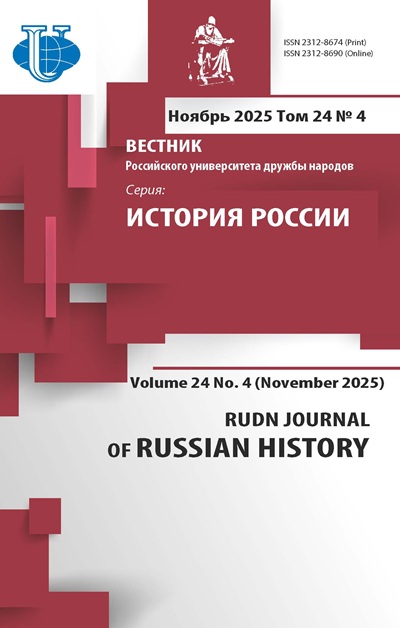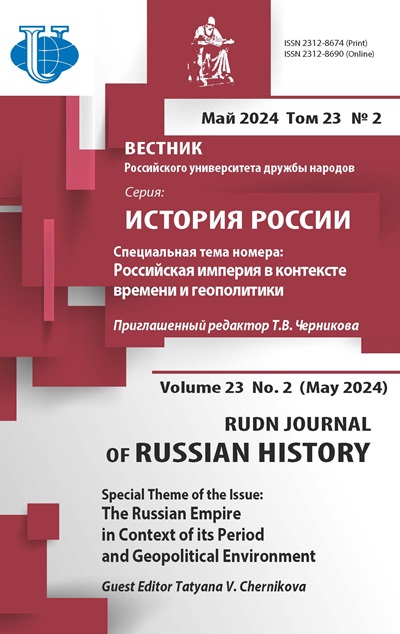Том 23, № 2 (2024): Российская империя в контексте времени и геополитики
- Год: 2024
- Статей: 10
- URL: https://journals.rudn.ru/russian-history/issue/view/1773
- DOI: https://doi.org/10.22363/2312-8674-2024-23-2
Весь выпуск
РОССИЙСКАЯ ИМПЕРИЯ В КОНТЕКСТЕ ВРЕМЕНИ И ГЕОПОЛИТИКИ
«Греческий проект» в политической практике и имперской идеологии России в царствование Екатерины II
Аннотация
Дана расширенная трактовка «Греческого проекта» как не только внешнеполитического, но и внутриполитического начинания государственной власти, имевшего специфическую идеологическую составляющую. Источниковой базой, помимо текста письма Екатерины II Иосифу II, послужили бумаги Г.А. Потемкина, А.В. Храповицкого, письма Алексея и Григория Орловых, переписка российской императрицы с Вольтером и другими идеологами европейского Просвещения, сочинения греков, в частности Евгения Вулгариса, различные документы внешней и внутренней политики, памятники российской культуры. Показано, что характерной чертой имперской идеологии царствования Екатерины II стал филэллинизм, который включал осознание прежде всего дворянской элитой наследия Античной Эллады как истока общеевропейской Цивилизации и сочувствие потомкам великих эллинов, единоверцам, попавшим под иноземное османское иго, с одной стороны, а с другой - власть и российское общество согласно позиционировали Российскую империю как законную преемницу Византии, которая может и должна вернуть греков-единоверцев в европейскую цивилизацию.
 130-142
130-142


От Ейского укрепления до Ейской слободы: трансформация поселенческого уклада и особенности межевания на южных границах России во второй половине XVIII - первой половине XIX в.
Аннотация
Анализируется видоизменение поселенческого уклада Ейского укрепления, относящегося к одному из первых российских поселений на Азовском побережье. Основание Ейского укрепления связано с борьбой России с Османской империей за выход к южным морям. В дальнейшем Ейское укрепление (Ейский городок) являлось важным опорным пунктом при установлении административных границ между Землей Черноморского казачьего войска, Землей Войска Донского, Екатеринославской губернией и Кавказским наместничеством. Цель исследования заключается в выявлении особенностей трансформации поселенческого уклада и межевания на южных территориях России в процессе заселения и освоения новых территорий. Сделан вывод, что эволюция поселения от военного укрепления к селу демонстрирует модель сосуществования различных исторических типов поселений на казачьих территориях в конце XVIII - первой половине XIX в. После Генерального межевания в начале XIX в. по сравнению с соседними поселениями Ростовского уезда Екатеринославской губернии, Черноморского казачьего войска и Войска Донского Ейское укрепление оказалось в менее выгодном положении. Оно лишилось многих земельных угодий и выхода к рыбным ловлям. Однако дальнейшая история Ейского укрепления в первой половине XIX в. продемонстрировала его устойчивое развитие. В нем сохранился не только основной вид хозяйственной деятельности жителей - рыболовство, но и благодаря хозяйственному освоению новых южных территорий возродилась торговая деятельность.
 143-154
143-154


Российская имперская бюрократия и проблема формирования нового управленческого этоса в преддверии Великих реформ
Аннотация
Рассматривается проблема формирования новых основ управленческого этоса в Российской империи в первые годы правления Александра II. В качестве одного из примеров анализируется Записка юрисконсульта Морского министерства В.Е. Врангеля и отзывы на нее высокопоставленных сановников. Цель исследования состоит в определении основ новых этических норм, которые власть намеревалась транслировать в отношении чиновников. Показан важный аспект проблемы реформирования административного аппарата - изменение нравственного облика высших чиновников, большая часть которых никогда не причислялась ни современниками, ни исследователями к так называемой просвещенной бюрократии. Раскрыты причины, заставившие власть пойти на этот шаг, а также выявлены новые этические нормы, заложившие базу для формирования новых этических принципов. Автор пришел к выводу, что появление Записки свидетельствовало о продолжении и ускорении важного процесса профессионализации бюрократии, изменении нравственных ориентиров чиновников, вполне соответствовавшее самому духу времени. Хотя самой Записке официально ход так и не был дан, поднятые ею проблемы и намеченные изменения послужили важной базой для выработки нового управленческого этоса в дальнейшем.
 155-166
155-166


Взгляд жандармских штаб-офицеров на аппарат управления в Сибири в дореформенный период
Аннотация
Исследуется взгляд жандармских офицеров на чиновничий аппарат в Сибири в 30-е - 50-е гг. XIX в. Определен круг чиновников, о ком сообщали в своих донесениях жандармы, установлены источники получения жандармами информации о чиновничьем аппарате, выявлена трансформация взглядов жандармских офицеров на администрацию в Сибири. Основными источниками для проведения исследования послужили законодательные акты государственной власти, приказы по Корпусу жандармов, годовые отчеты, рапорты, различные донесения жандармов, находящиеся на хранении в Государственном архиве Российской Федерации, часть из которых впервые вводится в научный оборот. В процессе работы был использован историко-системный метод, позволивший исследовать предмет и объект исследования как совокупность взаимосвязанных элементов. В результате проведенного исследования автор при-шел к выводам, что жандармские офицеры, считавшие Сибирь неотъемлемой частью Российской империи, в своих донесениях сообщали о чиновниках всех рангов, выделяли целый ряд особенностей функционирования сибирской администрации (в их числе отсутствие действующего надзора за деятельностью чиновников, страха за совершение служебных преступлений, чрезмерная коррумпированность чиновничьего аппарата, распространение фаворитизма и пр.). Со временем в жандармских донесениях снижается острота критики в адрес сибирского чиновничества, а сами жандармы постепенно сливаются с чиновничьей средой, в то время как жандармское ведомство превращается в главный инструмент политического сыска органов государственной власти.
 167-178
167-178


Сербия в экономической стратегии Российской империи в конце XIX - начале ХХ в.
Аннотация
Определяется роль экономического фактора как составной части широкого российско-австрийского соперничества на Балканах, а также его роли в реализации глобальной политической стратегии петербургских правящих кругов. Источниковая база основана на материалах Архива внешней политики Российской империи. В статье анализируются планы Российской империи по экономическому проникновению на рынки Сербии в конце XIX - начале ХХ в. как часть глобальной политической стратегии петербургских правящих кругов по укреплению своего влияния в регионе. Особое место в статье уделено деятельности русского дунайского пароходства, поскольку его развитие конце XIX - начале XX в. позволяло Российской империи закрепиться на нефтяных рынках не только балканских стран, но и Австро-Венгрии и Германии. Его стратегическая роль существенно возросла после переворота 1903 года, когда в Сербию стал проникать крупный русский капитал, связанный с заинтересованностью Белграда в военных поставках из Российской империи. Автор приходит к выводу, что российская дипломатия не всегда правильно использовала свои возможности для укрепления своего влияния в стране. Товарам из Российской империи так и не удалось получить абсолютного преобладания на сербском рынке. Однако получение монополии на продажу в Сербии керосина, несмотря на общую убыточность деятельности русского дунайского пароходства, обеспечила Петербургу важное стратегическое присутствие в балканском регионе, явившись серьезным аргументом в политическом противостоянии с Австро-Венгерской империей, что особенно проявилось в годы Первой мировой войны.
 179-190
179-190


СТАТЬИ
Чехословацкая центральная экономическая комиссия в документах Российского государственного исторического архива Дальнего Востока
Аннотация
Рассматривается экономическая деятельность граждан Чехословацкой республики на Дальнем Востоке в годы Гражданской войны. Главное внимание уделено Чехословацкой центральной экономической комиссии, созданной для решения экономических проблем значительного воинского контингента, сосредоточенного во Владивостоке в ожидании отправки в Европу. Деятельность комиссии до сих пор не нашла отражения в историографии, не введены в научный оборот документы, позволяющие достоверно представить структуру, кадровый состав, основную сферу деятельности, вклад в решение жизненно важных для находящихся на чужбине бывших военнопленных и членов их семей. Источниковая база представлена документами Российского государственного исторического архива Дальнего Востока, прежде всего фондов правительственных учреждений, сосредоточенных во Владивостоке. Особое внимание обращено на договоры, заключенные Чехословацкой центральной экономической комиссией с Временным правительством Дальнего Востока - Приморской областной земской управой, Центральным всероссийским союзом потребительских обществ (Центросоюз). Показано, что статус Чехословацкой центральной экономической комиссии в годы Гражданской войны поменялся. Если изначально она действовала как правительственное учреждение, то в дальнейшем как частное коммерческое предприятие, деятельность которого завершилось уголовным преследованием.
 191-202
191-202


Обеспечение законности и служебной дисциплины в органах НКВД Дальнего Востока в годы Великой Отечественной войны
Аннотация
Исследуется состояние служебной дисциплины и законности в территориальных органах НКВД Дальнего Востока в годы Великой Отечественной войны, причины совершения сотрудниками правонарушений, специфика привлечения виновных к ответственности, а также формы и методы профилактической работы с личным составом. Источником для анализа послужила внутренняя документация управлений НКВД Хабаровского и Приморского краев, а также материалы первичных парторганизаций, отложившиеся в региональных архивах данных субъектов РФ. Также использовались документы центрального аппарата НКВД СССР, Прокуратуры СССР и Политбюро ЦК ВКП(б), хранящиеся в фондах Государственного архива РФ и Российском государственном архиве новейшей истории. Изучая заявленную проблематику, удалось не только констатировать наличие неблагополучной ситуации в сфере соблюдения дисциплины и законности, но и установить детерминанты данных явлений. В ходе исследования во многом подтвердился неоднократно отмечаемый в историографии тезис о влиянии кадрового голода и проблем материального обеспечения на эффективность деятельности органов НКВД в военный и послевоенный периоды. Установлено, что комплекс профилактических мер, направленных на укрепление дисциплины и законности, включал в себя пресечение морального разложения сотрудников; использование методов групповой ответственности; коллективное обсуждение наиболее резонансных нарушений законности; контроль со стороны руководства органов НКВД; кадровые ротации; повышение правовой культуры и юридической грамотности персонала; внедрение армейских методов поддержания дисциплины.
 203-215
203-215


Бытовой антисемитизм в СССР
Аннотация
Рассматривается феномен бытового антисемитизма в СССР на основе массовых статистических данных о выборах в местные Советы депутатов трудящихся. Этнический состав депутатов проливает свет на отношение населения не только к евреям, но к национальной политике властей. Автор показывает, что результаты выборов свидетельствуют о стойком негативизме населения к еврейским кандидатам и соответственно к еврейским гражданам в целом. Евреи в местных органах власти были всегда недопредставленными, так как их доля среди депутатов почти всегда была ниже, чем в составе населения. Однако репрезентативность евреев росла вместе с повышением статуса Советов, по мере усиления влияния власти на состав депутатов. В общесоюзных и республиканских Советах до войны евреи были даже сверхпредставленными. Благодаря государству антиеврейские настроения не исключали евреев из общественной жизни, из элиты и управления обществом. Только переход многих евреев в оппозицию к режиму и массовая эмиграция на Запад, начавшаяся в 1950-е гг., принципиально ухудшили отношение к ним со стороны советских властей и избирателей.
 216-231
216-231


ИСТОРИОГРАФИЯ И МЕТОДЫ ИСТОРИЧЕСКОГО ИССЛЕДОВАНИЯ
Россия и Центральный Кавказ в советском и современном научном дискурсе: от «колониализма» до российской государственности
Аннотация
Рассмотрена проблема присоединения народов Центрального Кавказа к России в советской и современной историографии. Цель заключается в определении основных тенденций регионального сегмента советской историографии, которые остаются актуальными в современном дискурсе, и в представлении современного вектора исследования обозначенной проблемы. Дана периодизация историографии советского периода. Выявлено, что в 1930-е гг. произошла замена формулы «абсолютного зла» на формулу «наименьшего зла» с точки зрения присоединения нерусских народов к России. В 1950-е гг. был взят курс на обоснование прогрессивной роли присоединения нерусских народов, и появилась идея добровольного характера их присоединения. Показана судьба тех историков, которые не смогли безоговорочно принять смену исследовательской парадигмы. Отдельное внимание получил анализ современной историографии; показано ее принципиальное отличие от советской - исследование вопроса без каких-либо идеологических установок и перевод его исключительно в научную плоскость. Мотивом обращения к проблеме является исследовательский интерес к модернизационным процессам пореформенного времени. В результате многоаспектных исследований пересмотрена оценка роли социально-культурных институций, которые служили целям мирного покорения народов Центрального Кавказа, выявлена их позитивная роль.
 232-243
232-243


Генеалогия в системе современного знания: теория и методология когнитивной истории О.М. Медушевской
Аннотация
Анализируется место генеалогии как своеобразного индикатора гуманитарной культуры как в исторической ретроспективе, так и современного общества, поскольку предметом ее изучения традиционно являются общечеловеческие ценности - семья, родственные связи и отношения между разными поколениями. Цель исследования - показать роль известного историка О.М. Медушевской и значение разработанной ею теории и методологии когнитивной истории для определения места генеалогии в системе современного знания. В статье в рамках данной теории определяется место генеалогии в системе современного знания, дается четкое определение предметной области генеалогии как научного направления, возможности междисциплинарного синтеза с рядом фундаментальных наук и сформулирована программа развития данной области знаний в России. Автор приходит к выводу, что подход, разработанный О.М. Медушевской, превращает генеалогию из вспомогательной и прикладной дисциплины в одно из центральных направлений гуманитарно-исторического познания, делая ее информационным ресурсом для изучения истории семьи и рода, экономической истории (перемещения собственности и имущества), социально-политической структуры общества (или истории сословий), культуры и отдельных ее представителей.
 244-252
244-252
















